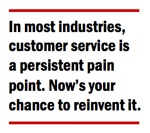Today, even the youngest, most modest consumers have broadband Internet access, carrying powerful, interconnected mobile devices everywhere they go. This gives them access to products, services, and information from anywhere, at any time–on their terms and on their schedules.
Leveraging these devices from home, school, and work, today’s customers quickly access myriad databases and technological tools from dozens of different sources. As a result, the average customer (whether business or consumer) often knows more about pricing, availability, and market demand than the companies from which they buy.
Consumers and businesses alike research, connect, and purchase online and over their phones without a second thought. And it has changed what they expect from the companies who serve them.
Customers Have Radically Greater Expectations Than You Probably Realize
With this access and these tools come radically higher customer expectations. Higher expectations of experience. Greater demands for personalization and customization. Lower tolerance for mistakes, for jumping through inane hoops, or for interactions that require mindless repetition. (“What is your account number?”)
In short, the world has changed dramatically, but many companies have not. Forget about innovation–they’re not even sure how to keep up with the (smart) new companies already taking advantage of this environment and thriving while delighting their customers.
This is the challenge your company needs to confront.
But that’s OK. Because the exact same forces making your customers and some of your competitors smarter can make your company smarter–and more relevant, innovative, responsive, and competitive as well. And that’s just the beginning. In fact, there are dozens (if not hundreds or thousands) of ways you can leverage digital innovation to disrupt your industry. Here are three ways to accomplish this:
1. Personalize products and services: Digital innovation lets companies modularize services in ways that are entirely replicable, yet completely customized. Think iTunes, Netflix, or Pandora. Or Zipcar.
As a Zipcar customer, your experience is totally personalized based on where you are and what you want. Zipcar brings offline processes online, helping you find and choose the best car for you, no matter where you are. The company also uses this data to help improve experience and drive value, giving it about double the revenue and efficiency of a traditional car rental company.
Mass customization driven by smart touchpoints creates highly personal experiences that are difficult for competitors to match.
2. Make your touchpoints smart: If you look at every touchpoint as an opportunity to leverage technology and/or data to gain knowledge of your customers, their needs, their surroundings, and other factors, then you can interact with them more intelligently than ever.
Speaking of smart touchpoints, how many of your products would benefit from being 'smart'?
Consider Nest, one of the first learning devices about to populate our homes and offices. Turn it on and it learns your preferences, such as when you need the room warmer and when it’s OK to let things cool down a bit. It’s also one of the first everyday, 'boring' objects infused with an Apple-like design sense. You’ll be seeing many more.
Or ET Water, which sells 'smart' irrigation controllers for commercial and municipal landscapes, making a once 'dumb' industry incredibly intelligent by integrating weather forecasts, soil conditions, and historical data to save water, save money, and increase efficiency.
3. Reinvent customer service: What if you could set a new standard for customer experience in your industry? In most industries–at least from the customer point of view–customer service is a persistent pain point.

With nearly 90 percent of all customers willing to walk away from a company after a single poor experience, the costs of getting this important element wrong can literally sink your firm.
Amazon, with the highest score (derived from American Customer Satisfaction Index) among all e-commerce and retail trade companies, uses email, chat, and Web-based tools to address the vast majority of customer service issues–rarely having to actually talk with a customer. And when it does, you enter your number and Amazon calls you. No annoying IVR, hold time, or account numbers re-entered multiple times 'for security purposes.'
The tools exist for any company to do this, with the significant added benefits of reducing service costs and boosting service levels for those customers that simply aren’t as valuable to you.
It’s Always Better to Be the Disruptor Than to Be Disrupted
The list of companies–and industries–that have already been disrupted by these changes is a long one. Companies like Kodak, Blockbuster, and Borders. Industries such as music, publishing, and retail.
The new world order comes down to this:
- Smart customers are empowered, demanding, and self-directed–and they choose to do business with smart companies.
- These smart companies are intelligent, innovative, thriving, and designed to do business with smart customers.
- Then there are the stupid companies. Those firms that don't know they need to change or are unable or unwilling to do so, that are marginalized and uncompetitive and–though many don’t know it yet–failing.
Massive disruption is coming; in some industries, it has already arrived. The only question is whether your firm is going to cause it or fall victim to it.
So here’s our prescription: Be the first established firm to disrupt your own industry because it’s going to happen anyway. And it’s more profitable (and way more fun) to be the disruptor than to be the victim of disruption.

